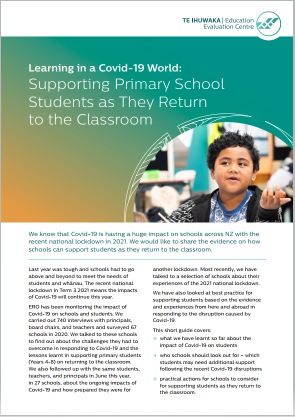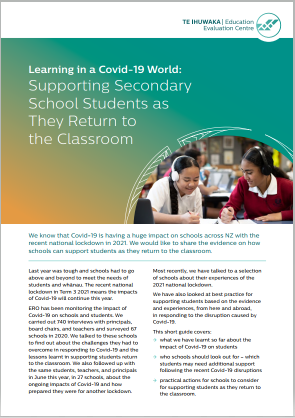- Audience:
- Education
- Māori-medium
- Parents
- Schools
New reports published by Te Ihuwaka set out how prepared students and schools felt ahead of the Covid-19 lockdown in August and provide recommendations for how schools can support their students as they return to the classroom.
Over the past year, Te Ihuwaka has been monitoring the impact of Covid-19 on schools and students. We have worked with people from across ERO to carry out 740 interviews with principals, board chairs and teachers and survey 67 schools in 2020 to find out about the challenges they had to overcome in responding to Covid-19 and the lessons learnt in supporting students return to the classroom. We also followed up with the same students, teachers, and principals, in June this year, in 27 schools about the ongoing impacts of Covid-19 and how prepared they were for another lockdown.
How can these new reports support schools?
Te Ihuwaka’s new reports outline practical actions schools can take for re-engaging students back in the classroom and addressing any learning loss that may have occurred as a result of lockdown.
For example, we know that strengthening relationships with students and their whānau and giving students opportunities to make decisions about their learning can help support student reengagement.
We also know that some students will need additional learning opportunities to help them succeed. This is where schools can consider accelerated learning programmes, which could include tailored group and individual acceleration programmes for those learners who are at risk of not catching-up.
Te Ihuwaka hopes that school leaders find these new resources helpful for understanding the impact of lockdown on their students and the practical actions they can take to support learners. We also hope they will help schools will continue to prepare for further disruptions.
To help get these resources in the hands of school leaders, please feel free to share them with those that you work with.
Which students may need extra support?
The most recent report found that, whilst schools have gone above and beyond in supporting students to learn in lockdown our research shows that some students are likely to need additional support when they return to the classroom.
For example, not all students were confident about being able to learn from home when we talked to them in June. NCEA students were least confident they could learn from home with just under two-thirds of NCEA students agreed or strongly agreed they would be able to learn from home, compared to around three-quarters of Year 4-8 students.
Māori and Pacific students are likely to be particularly impacted. 21 percent of Māori students and 19 percent of Pacific students said they would not have access to a digital device or were unsure, compared to only seven percent of New Zealand European students.
Students in low decile schools may also need extra help. In June around nearly one in five of low decile students we spoke to didn’t have a device at home or were unsure, compared to less than one in twenty of high decile students. We also found that principals in low decile schools were less confident they were prepared for another lockdown.
Read the resources
You can read these two new reports Learning in a Covid-19 World: Supporting Primary and Secondary School Students as They Return to the Classroom on ERO’s website: www.ero.govt.nz.

Learning in a Covid-19 World: Supporting Primary School Students as They Return to the Classroom
Learning in a Covid-19 World: Supporting Primary School Students as They Return to the Classroom

Learning in a Covid-19 World: Supporting Secondary School Students as They Return to the Classroom